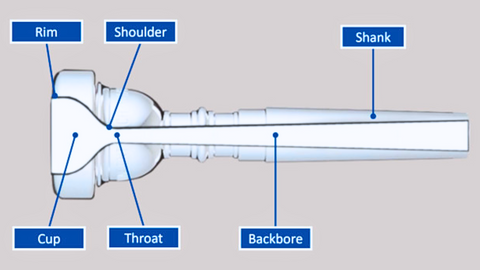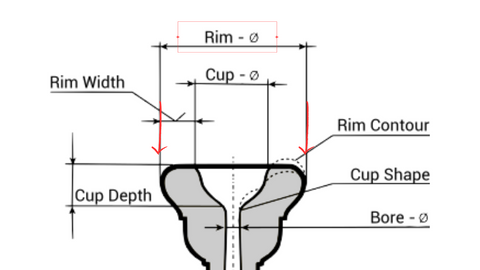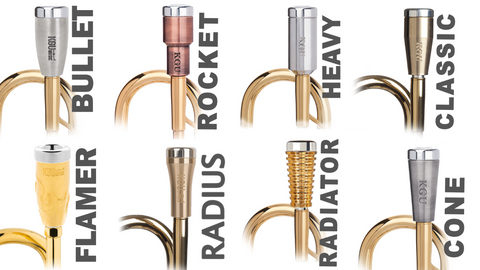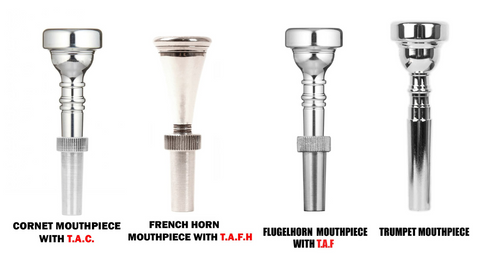Choosing the Right Mouthpiece for Your Brass Instrument
Sometimes musicians care too much about the brand of the instrument but neglect time and efforts to select the right mouthpiece. However, the mouthpiece you get with the instrument might not fit you as a player. Brass musicians should seek the model that meets their needs and suits the instrument as well. When selecting the right mouthpiece for brass instruments, one should consider many different factors such as musician’s jaw and shape of the lips, desired intonation and tone quality, the material of the mouthpiece and others.

The Guide on Choosing a Mouthpiece
Cup shapes, depths, materials and other components of the mouthpieces result in a wide range of tones, allowing musicians to make their sound fit various musical contexts. Let’s look at each component in more detail.
Mouthpiece Cup Depth
The first thing to consider is what kind of tone you want to reach. The size and shape of the cup impact a player's ability to produce different registers and articulations. Larger mouthpieces are played for lower registers, while smaller mouthpieces are used for the higher registers. Mouthpieces with a larger cup diameter and cup volume provide more lips vibrations, which results in a fuller and more resonant sound. These models encourage better lip control and endurance. Larger deep cups produce lower, darker sounds, while mouthpieces with small or shallow cups allow producing the brightest sounds.

It’s better to choose a model that is close to the size of the mouthpiece that you currently use. If you haven’t clarified your tone yet, choose mouthpieces with a medium cup depth. They are the best options for beginners who are still discovering their sound. When it comes to cup shapes, U cups produce a powerful sound, V cups create a mild sound. Mouthpieces with U cups are used for trumpet and trombone mouthpieces, while slightly U and V cups fit horns.
The Material of your mouthpiece
Today you can buy mouthpieces made of brass, titanium, silver, stainless steel, plastic. Silver models can produce a dark and heavy sound, however they may not resonate so well as brass mouthpieces. Stainless models boast brilliant sound and can work best for solo performances. Titanium mouthpieces produce a solid and bright tone. The material doesn’t cause allergenic reactions, however, for some players titanium mouthpiece sound may seem very light. Plastic mouthpieces can save you lots of money, as they are the cheapest on the market.
The shank of mouthpiece

Instruments and mouthpieces should be considered as one whole component. Try mouthpieces out with your current instrument. Look if your instrument and shank firmly matches, as the compatibility between the mouthpiece shank and the instrument's lead pipe is essential for excellent playability and sound production. Otherwise, you are at risk of getting fuzzy sound and low-quality performance with air leaks, poor intonation and reduced responsiveness.
How to choose a mouthpiece with the right rim?
This is one of the most crucial components of the mouthpiece. The first and the most important piece of advice for all brass musicians is selecting a mouthpiece with a rim suitable for their lips. The players should feel comfortable with the rim diameter, contour, width, and the bite. Mouthpieces with sharp rim bite are suitable for those, who play with a clear attack and don’t miss tones. For beginners, it’s better to start with a round rim bite.

Regarding rim diameters, the large rim diameter provides more surface area for the lips to distribute pressure. With these mouthpieces, the musician experience a better comfort and stability during prolonged playing sessions. Players with larger lips or those who seek more endurance may prefer larger rim sizes. A smaller rim diameter provides more precision and control, so they are suitable for players with smaller lips or those who like a more focused sound.
Mouthpiece Boosters
Well-crafted in terms of weight, geometry, and design, boosters provide the musicians with enhanced tonal quality, rich overtones and make it easier to play high notes. Inserted between the mouthpiece and the trumpet's lead pipe they make the sound of the instrument more impressive, provide a better stability especially in the upper registers, and create a more vibrant sound. Boosters suit musicians playing in large ensembles and those who perform solos.


